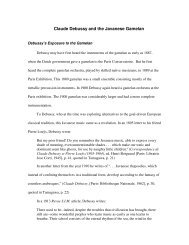Music Preference 1 - Brent Hugh's personal and business web pages
Music Preference 1 - Brent Hugh's personal and business web pages
Music Preference 1 - Brent Hugh's personal and business web pages
Create successful ePaper yourself
Turn your PDF publications into a flip-book with our unique Google optimized e-Paper software.
<strong>Music</strong> <strong>Preference</strong> 7<br />
easier to manipulate opinions of a musical performance ("Which performance of this piece do<br />
you prefer?"), however, than to change opinions of the compositions themselves ("Which of<br />
these two compositions do you prefer?"). This finding squares with Hargreaves’s theory (1984)<br />
that musical prejudices are paramount in determining liking for particular compositions <strong>and</strong><br />
styles. Attitudes about other aspects of the music (for instance, the relative value of different<br />
performances of a single work) may be more easily influenced.<br />
Furman <strong>and</strong> Duke (1988) demonstrated that students’ opinions about musical excerpts were<br />
affected by the verbally expressed opinions of others in the room. Students were asked to<br />
evaluate <strong>and</strong> compare two musical excerpts. Students were more susceptible to influence by the<br />
opinions of others when the excerpts were identical, <strong>and</strong> less susceptible when the excerpts<br />
varied significantly. Students less familiar with the general style of the excerpts were more<br />
susceptible to the influence of other’s opinions, while those more familiar with the style were<br />
less susceptible to the influence of others.<br />
Hargreaves (1986), analyzing seven studies dealing with the influence of "prestige <strong>and</strong><br />
propag<strong>and</strong>a" on music preference ratings, concluded that six of the seven studies "found social<br />
influences to have a significant effect on aesthetic judgements, <strong>and</strong> it may be that these are more<br />
powerful in the case of music than in other art forms" (p. 198). Two of the studies show strong<br />
prestige effects on the musical judgements of musically experienced subjects, which Hargreaves<br />
found surprising because "it seems intuitively quite likely that the power of social influences<br />
should be inversely related to the background knowledge of the listener" (p. 198).<br />
Clearly the social context of music is important, <strong>and</strong> developing a positive social context<br />
may be crucial in encouraging a positive preference, both among experienced <strong>and</strong> inexperienced<br />
listeners.





